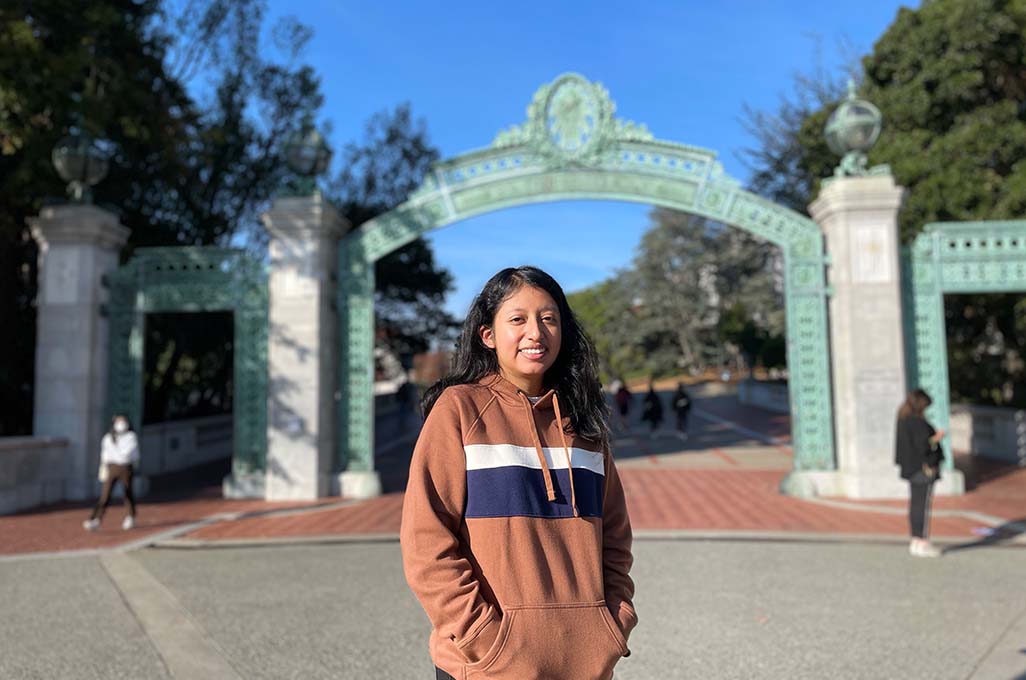Ánimo Venice Alum Reflects on First Year of In-Person College Courses

In the fall of 2020, Animo Venice Charter High School alumna Jenny Mendez started her first set of college classes at University of California, Berkeley —a campus she had never visited — on a computer in her bedroom in Los Angeles.
Earlier that year, the COVID-19 pandemic shifted lively college campuses into contained virtual hubs to reduce the spread of the virus. However, for Mendez, it meant delaying her visit to Berkeley until it was safe. One year later, in the fall 2021 semester, Mendez arrived at the university for the first time, saying it felt like it “was freshman year all over again.”
We spoke with Mendez, the 2020 valedictorian at Ánimo Venice Charter High School, about starting her college experience remotely. A year later, she discusses her transition from remote learning to in-person instruction, and how it has changed her outlook on attending Berkeley, over 370 miles away from home.
Q: Looking back, how was your first year in college?
A: I became an academic intern for one of my computer science courses that I took and passed. I also ended up attending summer classes, which was kind of nice. Now, I’m working as a math tutor. So I'm working part-time, but I’m still continuing classes in my sophomore year.
What has the in-person transition been like at UC Berkeley?
Yeah, it is quite different. Because when I work remotely, it's easier for me to ask questions. And if I don't really understand the material, I can just always go back or rewind. In person, it's harder to ask questions, because I'm personally not very comfortable asking questions, or raising my hand.
So the transition to remote learning is quite challenging on that part. And attending class in person is very time consuming — well, mainly walking to class. When we're online, it's just one click of a button to get to class.
But I really like in-person learning, because it's nice to talk to people and see others. It's nice to get familiar with other people, especially in my English class. In fact, I got to know someone whose background is similar to mine. She has a Filipino background and I grew up with a Mexican background, but we’ve bonded over so many things.
Since your sophomore year is actually the first time you left home for college, how difficult was the transition?
At first it was hard. During the first few weeks, it was difficult not having my family around. They were always there for me even during my hard times. Like when I didn’t get a good grade on an exam or something like that, I always went to them. They motivate me. But even though they're not here, I know that they're always with me no matter what.
But while it’s been hard, it’s been worth it. Personally, I felt like I kind of needed to leave home because I wanted to explore and try a new experience. I’ve lived in Los Angeles for all of my life. I don't regret leaving home. In fact, I felt like I learned a lot about myself because I had the space and the environment to reflect, thanks to the community that I’ve found.
Thinking about your past, how did Ánimo Venice help you to excel in college?
I think about my high school experience all the time in my math classes. In one of my math classes, the professor was talking about something that reminded me of my previous math teacher, Mr. Castro. He would always say “don't always say plug it in.” And then it was funny because in this class the professor would always say “plug it in.”
Another thing I learned at Ánimo Venice is how to learn concepts and not just memorize, because memorizing won’t get you far. It’s important to learn the concepts and really understand why you are doing the things that you're doing. Really, I think about all of the classes I took at Ánimo Venice. They introduced me to so many ideas, and they’ve really helped me in my courses.
Being in-person, what’s one experience that has helped you grow as a student?
I’ve used the Student Learning Center a lot, which has helped me in becoming a confident math tutor. The Center has a bunch of training sessions, and the trainees really helped me to learn how to teach a student to solve a math problem. They also remind us of our objectives. One in particular has stuck with me, which is, “learning is not a product, but a process.”
As a tutor, I help students with math problems. We help other students understand the “why” behind the problem, instead of trying to get the right answer. I really feel like I’ve grown through this program, and it’s helped me become confident as a tutor.
The last time we spoke, you said you had dreams of becoming a computer programmer. Now, in your second year of college, what are your career plans?
I honestly don't know. Before, it was computer science. But now, I just know that I really love math. And I really like the path that I'm going on.
I’m taking these computer sciences courses, and I’m learning that computer science is a very broad field. Now, I'm trying to figure out which of these specific topics do I really want to pursue, So I'm on the edge of computer science, but I’m thinking of math right now. I don't know what I'm gonna do with it, yet. But I just know that that's something I want to do.
